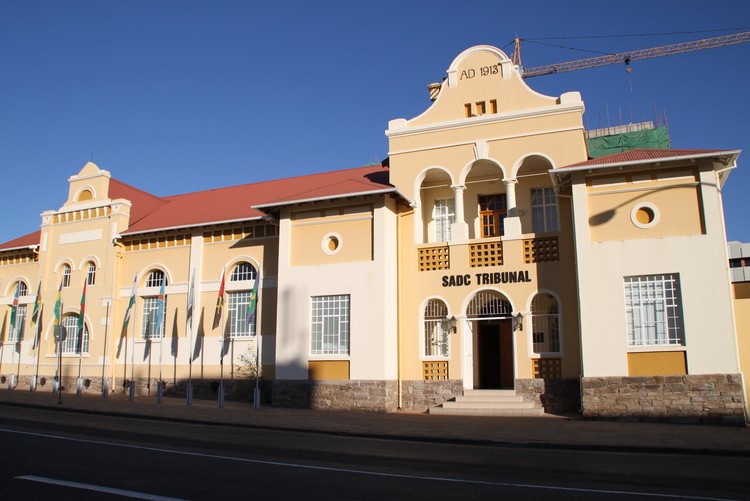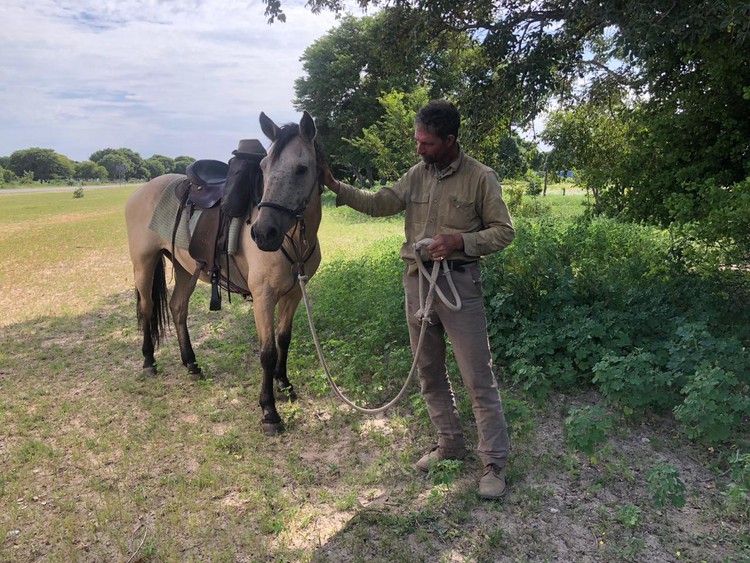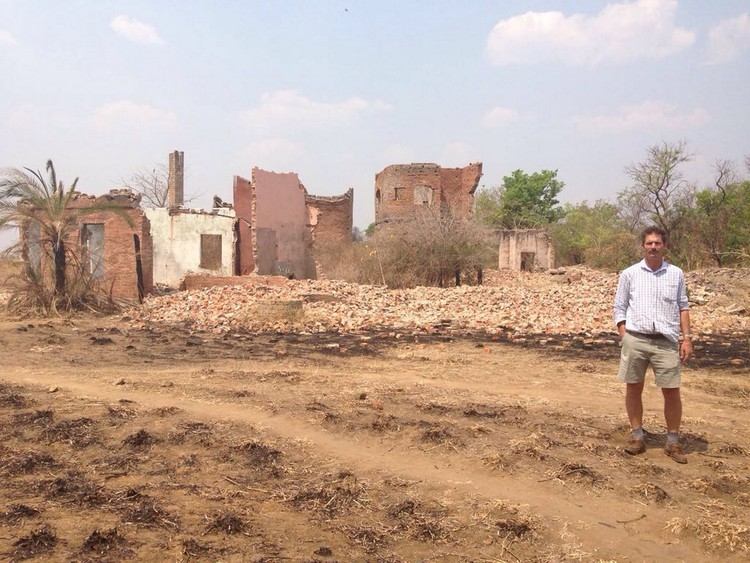Why a farmer is riding from Zimbabwe to Windhoek on a horse
Ben Freeth will petition for the reinstatement of the SADC Tribunal
The South African Development Community Tribunal in Windhoek has been limited to hearing disputes between member countries. A new protocol signed in 2014 does not provide for complaints from citizens against their own countries. Photo: Wikipedia user Head (CC BY-SA 3.0 Deed)
- In 2009, the SADC Tribunal ordered Zimbabwe to give farms it had expropriated in its catastrophic land grabs since 2000, back to the farmers. The Zimbabwean government under Robert Mugabe, ignored the order.
- In 2011, following a campaign by Mugabe, the SADC Tribunal was suspended.
- SADC drew up a new protocol, signed in 2014, which limited the Tribunal to dealing with disputes between member states.
- President Zuma’s role in signing the new Protocol, which prevents SADC citizens from seeking redress for human rights violations, has been declared unconstitutional.
When Ben Freeth headed west on horseback from the derelict Mount Carmel farm near Chegutu in Zimbabwe on 28 November, he had to lay low. For about 800km, Freeth avoided roads and stuck to the bush, following game paths where he could, while scouting the drought-stricken land for water and grazing for his horse, Tsedeq.
It was only after he crossed the border into Namibia’s Caprivi Strip at the Kazungula border post that he could relax, stop fearing attack from forces despatched by the Zimbabwean government, and publicise the reason for his slow journey to Windhoek – a bid to have the suspended Southern African Development Community (SADC) Tribunal re-established.
Staying off the beaten path was not due to paranoia. Freeth is familiar with Zimbabwe’s state-sponsored violence. In 2008 he, together with his in-laws Mike and Angela Campbell, were tied up on their farm by war veterans acting on behalf of former tyrannical president Robert Mugabe. They were driven into the bush, beaten and tortured. Freeth, who had built a house on his in-laws’ land and helped run what was the most successful mango exporting farm in the country, suffered a fractured skull as a result.
The abduction and torture happened two weeks before the Southern African Development Community (SADC) Tribunal was due to hear a case brought by Mike Campbell, later joined by 77 other applicants, against the Republic of Zimbabwe. The case, which Freeth attended bandaged, battered, and in a wheelchair, challenged the harassment, forced eviction of farmers, and seizure of farms instituted by Mugabe in 2000.
In its unanimous decision on 28 November 2008, the Tribunal ordered Mugabe’s government to protect “possession, occupation and ownership” of all the applicants’ farms, except for two, who had already been forcibly evicted. The state was ordered to pay them compensation.
Mugabe ignored the Tribunal’s ruling. Freeth and his family, including his children, and the Campbells, suffered increasing harassment and threats as they continued to run their farm, until their homes, and those of the farm workers, were burnt down by war veterans eight months later. Freeth’s home was burnt down on 30 August 2009, with the Campbell’s home suffering the same fate two days later.
The disbandment of the SADC Tribunal
Mugabe’s refusal to abide by the Tribunal ruling, with former South African president Jacob Zuma as a willing ally, and his subsequent successful campaign to suspend the Tribunal at the SADC Summit in 2011, has led Freeth to take the approximately 2,000km journey to Windhoek, where the SADC Secretariat sits at the city’s Turnhalle.
The Summit had effectively disbanded the Tribunal by deciding not to reappoint the judges whose term of office was ending in 2010, nor replace those whose term of office would end in 2011.
“Instead of the SADC Summit acting to ensure that Zimbabwe complied with the SADC Tribunal judgments, it sided with Zimbabwe which had begun a diplomatic attack on the Tribunal employing very weak legal arguments alleging that the SADC Tribunal was not lawfully established,” wrote Moses Retselisitsoe Phooko and Mkhululi Nyathi in the De Jure Law Journal.
Ben Freeth gets to know a new horse, Stardust, lent to him by a Namibian farmer.
Photo: Mike Campbell Foundation
Then in August 2014, Mugabe, along with other heads of state including Zuma, signed a new protocol limiting the Tribunal to only dealing with disputes between SADC states. SADC citizens were then prevented from accessing it to deal with human rights violations should their own government fail to follow the rule of law, as has been the case in Zimbabwe.
In seeking to get the Tribunal fully reinstated, Freeth says his journey is about justice. “It’s about justice throughout SADC, protecting people and their property.”
Overwhelming support
When he arrives on 18 March, Freeth intends to hand a letter to the Secretariat requesting the Tribunal be reinstated. Buoyed by an outpouring of support since he made his mission public, he has asked people to join him when he rides into Windhoek. His 13-minute telephone conversation with GroundUp while he was walking along the road with his horse was twice interrupted by well-wishers, with one offering him feed and overnight accommodation.
The day of his arrival is not auspicious, but the day of his departure from the now ruined Mount Carmel farm in Zimbabwe was. It was 15 years to the day since the Tribunal ruled in favour of his late father-in-law and other farmers.
Asked why he was going to Windhoek on horseback, Freeth told GroundUp: “You can sit at home and write a letter or email, which might get a response, or you can walk 2,000km to do it, which is more likely to get a response.”
The epic journey, he said, gave impetus to the cause, and since he had raised his head above the parapet in Namibia, it had “captured people’s imagination” and he had received overwhelming support. But amidst the support, including in Zimbabwe where people in poverty-stricken rural villages he passed welcomed him and provided water they had themselves collected from wells two or three kilometres away, he has also been threatened.
He said on Friday 1 March, he received a call on his Namibian cellphone number, which in itself was strange as he not given it out to anyone. “No-one knows my Namibian number,” he said. “They could only have got it from the service provider.”
He said he received several calls that day from the same person. “He was using a lot of swearwords and a lot in Afrikaans, and kept asking: ‘Where are you?’, and said ‘I’m coming to get you’.”
As a result, Freeth went away from the road for the rest of the day and followed the railway track.
South Africa’s complicity
In the face of the SADC Summit’s dissolution of the Tribunal, South African courts have had to make decisions pertaining to the human rights abuses in Zimbabwe, and South Africa’s duties in respect of international law.
The records of the North Gauteng High Court, Supreme Court of Appeal (SCA), and the Constitutional Court show a long and slow trek to justice that began, according to attorney Willie Spies, with Zimbabwean farmers vainly trying to get the Zimbabwean courts to enforce the Tribunal’s rulings.
Spies, who is Afriforum’s legal representative and representing Zimbabwean farmers in cases before the South African courts, said litigation in South African began in 2010 after farmers realised they weren’t making any progress in the Zimbabwean courts, as these had been captured by judges loyal to Mugabe.
An order by the high court in Pretoria gave punitive costs against Zimbabwe for failing to enforce the Tribunal ruling to protect private land and pay compensation. This was upheld by the Constitutional Court in 2013. But with Zimbabwe refusing to acknowledge the order, the High Court, in 2015, attached a Zimbabwean asset that was sold on auction to pay the farmers who brought the litigation.
Ben Freeth at the ruins of his family home at Mount Carmel farm near Chegutu, Zimbabwe, in 2016. Photo: Mike Campbell Foundation
“That caused alarm bells to go off among SADC leaders,” said Spies. Nine countries had signed the new protocol in 2014 which removed the Tribunal’s mandate to hear cases filed by individuals against member states, allowing it only to hear inter-state disputes.
At this point the Law Society of South Africa (LSSA) and six Zimbabwean farmers, which included Ben Freeth, approached the high court in Pretoria to declare the Tribunal’s suspension and Zuma’s signing of the 2014 Summit Protocol unconstitutional.
The judgment handed down on 1 March 2018, saw them succeed, with one exemption, being that no causation between Zuma signing the Protocol and the losses suffered by the farmers was found.
Spies said as the High Court judgment set legal precedent, it had to be confirmed by the Constitutional Court. The Constitutional Court judgment of 11 December 2018 stated it was “clear … that the President’s (Zuma’s) conduct, resulting as it did in a breach by South Africa of its obligations under an international treaty as a State, was impermissible under the Constitution, as irrational and unlawful”.
However, seeking the ruling on causation, the LSSA vs President of South Africa was taken to the SCA, which in May 2022 found causation between Zuma’s involvement in scuppering the Tribunal, and the farmers’ losses.
South Africa then appealed the SCA’s findings in the Constitutional Court, with the appeal having been heard on 7 November last year.
Should the Constitutional Court uphold the SCA’s decision, it would allow the farmers to sue the South African government for the damages and losses they suffered as a result of Zimbabwe not honouring the Tribunal’s ruling, as the South African government would have been found complicit.
This judgment is awaited as Freeth rides to Windhoek, currently on a horse called Johnny.
You can follow Freeth’s journey on this blog.
Support independent journalism
Donate using Payfast

Don't miss out on the latest news
We respect your privacy, and promise we won't spam you.
Next: Community health workers march in East London
Previous: Ethekwini mayor warns strikers to return to work or face dismissal
Letters
Dear Editor
Africans were violently dispossessed of their land.
Robert Mugabe's solution was a complete disaster, but the likes of Afriforum are not offering an acceptable alternative. They instead want the beneficiaries of colonialism to keep "their land". This insistence by the settler community on calling it their land is tone-deaf and borders on arrogance.
I'd love to see the faces of the judges who sat at the SADC Tribunal and their names and their surnames.
Land reform in Southern Africa is inevitable. Zimbabwe is just the beginning.
Dear Editor
I am writing from Germany; I have long been thinking about the colonialism and the consequences for the people at the time then and now. I can follow the thoughts of Vimbai-Naye Chatitai in the response before mine, and I agree from my far point of view. In fact, when I read the story of Ben Freeth, I had the same thought. Vimbai-Naye Chatitai's text contains a lot of anger about these ever repeating claims of settlers.
On the other hand, it seems very difficult to give justice to everybody. If a settler's family bought land 100 years ago in good faith that they had acquired it from the rightful owner, and started their business on that land; is that morally condemnable?
These questions about a land reform need to be discussed on an individual basis. Each family's history is different. But the right of the black people and the feeling of finally experiencing justice is no less important. So you need to talk! It is important to express the feelings of both sides during that process, so that each side can see and respect what it means for each other.
I am hopeful that out of such talks some good solutions can be developed. I hope this will happen soon to everyone's satisfaction. At least, that's my wish for all the folks living in southern Africa.
© 2024 GroundUp. This article is licensed under a Creative Commons Attribution-NoDerivatives 4.0 International License.
You may republish this article, so long as you credit the authors and GroundUp, and do not change the text. Please include a link back to the original article.
We put an invisible pixel in the article so that we can count traffic to republishers. All analytics tools are solely on our servers. We do not give our logs to any third party. Logs are deleted after two weeks. We do not use any IP address identifying information except to count regional traffic. We are solely interested in counting hits, not tracking users. If you republish, please do not delete the invisible pixel.



